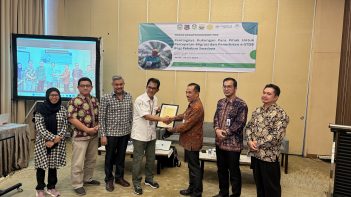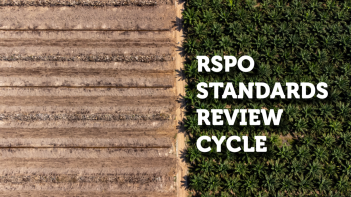Recent developments in palm oil research and newly approved oil palm varieties are boosting China’s prospects for a sustainable palm oil market, helping the country reduce its dependence on imports.
In China, the future looks bright for sustainable palm oil production. Promising developments in palm oil research as well as the emergence of diverse oil palm varieties in the largest resource nursery in Danzhou are accelerating the country’s prospects for a sustainable palm oil market.
On 25-26 March 2021, a delegation comprised of representatives from the China Chamber of Commerce for Import and Export of Foodstuffs, Native Produce and Animal By-Products (CFNA), the China-UK Collaboration on the International Forest Investment and Trade Programme (InFIT), the Roundtable on Sustainable Palm Oil (RSPO), and the World Wide Fund for Nature’s (WWF) Beijing office, along with independent experts, met with the Rubber Research Institute at the Chinese Academy of Tropical Agricultural Sciences — the Leading Group for Regional Adaptability and Trial Planting of Oil Palm Varieties.
A highlight of the meeting was the visit to the Danzhou palm oil germplasm resource nursery, the largest of its kind which was built by the Rubber Research Institute with the strong support of the Ministry of Agriculture and Rural Affairs. Covering a total area of 660 mu, the nursery houses 335 oil palm germplasm varieties, totalling 7,168 plants. A batch of high-yield, high unsaturated fatty acid content, seedless, short-growing, long-fruited and other specific germplasm materials have been evaluated and screened, laying the groundwork for the industrial development of China's palm oil palm varieties. This is a crucial step towards commercial cultivation, which is still non-existent in China, even if palm oil is already being distributed in the provinces of Hainan, Yunnan, Fujian, Guangdong, and Guangxi.
Luo Wei, Deputy Director of the Rubber Research Institute, discussed the progress of the Institute’s palm oil research, while Dr. Zeng Xianhai, the head of the palm oil research team and the oil palm trial planting cooperation office, spoke about the development potential and future direction for China's oil palm planting and use, avenues of cooperation, as well as the challenging bottlenecks currently being faced by the industry.
New oil palm varieties approved
In 2019, after nearly two decades of trial planting and with the support of the Ministry of Agriculture and Rural Affairs, a new oil palm variety, the "ElaeisGuineensisJacq.Reyou No.4", was approved and registered by the National Tropical Crop Variety Approval Committee. This new variety, jointly applied by the Rubber Research Institute and the Hainan State Farms Academy of Sciences, is China’s very first oil palm variety set to be promoted and planted on a large scale. This variety has the advantages of having a high, stable yield and potential for wide adaptability, strong resistance to wind and drought, and is suitable for promotion and planting throughout Hainan Province.
In 2020, another variety, "ElaeisGuineensisJacq.Reyou No.6", jointly bred by the Rubber Research and the Hainan State Farms Academy of Sciences, was also approved, becoming the second oil palm variety in China and the first of its kind with an annual oil yield of more than 200kg per mu. Chosen by the Chinese Academy of Tropical Agricultural Sciences after 20 years of introduction and domestication, this particular variety exhibits high quality, early flowering and fruiting, high and stable yield, and strong drought and wind resistance, likewise making it suitable for planting in Hainan Island and other regions with similar climates throughout China.
The simplified seedless variety, “ElaeisGuineensisJacq.Reyou No.40”, ideal for planting and processing under the agricultural model followed by Chinese small farmers, has already been successfully planted in some regions. This variety’s performance has been outstanding in Guangdong, Hainan and other trial locations, featuring high quality, high yield, cold resistance and other favorable characteristics.
Growing China’s domestic palm oil market
China ranks third in the world in palm oil consumption, but it is nevertheless dependent on palm oil imports, which exceeded 7 million tonnes in 2020. China’s No. 1 Central Document for 2021 once again proposed the strategy of "promoting the development of woody grain and oil", using slopes in tropical areas to grow oil palm and develop oil production. This will be significant in alleviating the contradictions between China’s "grain and oil competition for land" and increasing the self-sufficiency rate of edible oil. In addition, the importance of promoting the formation of a new development pattern, with domestic circulation as the mainstay, and domestic and international circulation complementing one another, have been repeatedly emphasised by China’s President Xi Jinping since May 2020.
Following extensive field investigations and regional trial planting, experts from the Rubber Research Institute’s palm oil research team project that the land area suitable for oil palm planting in China can reach more than 30 million mu, affirming that the industry holds huge potential for future development. The development of China's palm oil industry will be implemented step by step, moving from small to large-scale development, and will gradually shift northward to realise its ultimate goals for its development.
Planting sustainably-grown oil palm in China will help reduce the country’s dependence on imports, promote effective investment, and improve the sustainable development of the domestic palm oil market as well as related supply chains.
For any enquiries, please contact RSPO China Stakeholder Engagement representative Wan Jian at [email protected].
Keep reading

Save the Date: The 21st General Assembly (GA21) of RSPO Members
Interim Measure for Requirements 5.1.5 and 5.1.6 of RSPO Rules on Market Communication and Claims 2022

RSPO Partners with Indian Vegetable Oil Producers’ Association (IVPA) to Promote Sustainable Cultivation and Palm Oil Imports in India
Call for Expression of Interest: Independent Investigation of a Complaint

2024 China Sustainable Palm Oil Forum Calls for Bold Action on Supply Chain Sustainability
Reminder: Important Updates on Shared Responsibility

Smallholder Inclusion in Indonesia: Over 1,000 Farmers Registered in RSPO Pilot Districts




